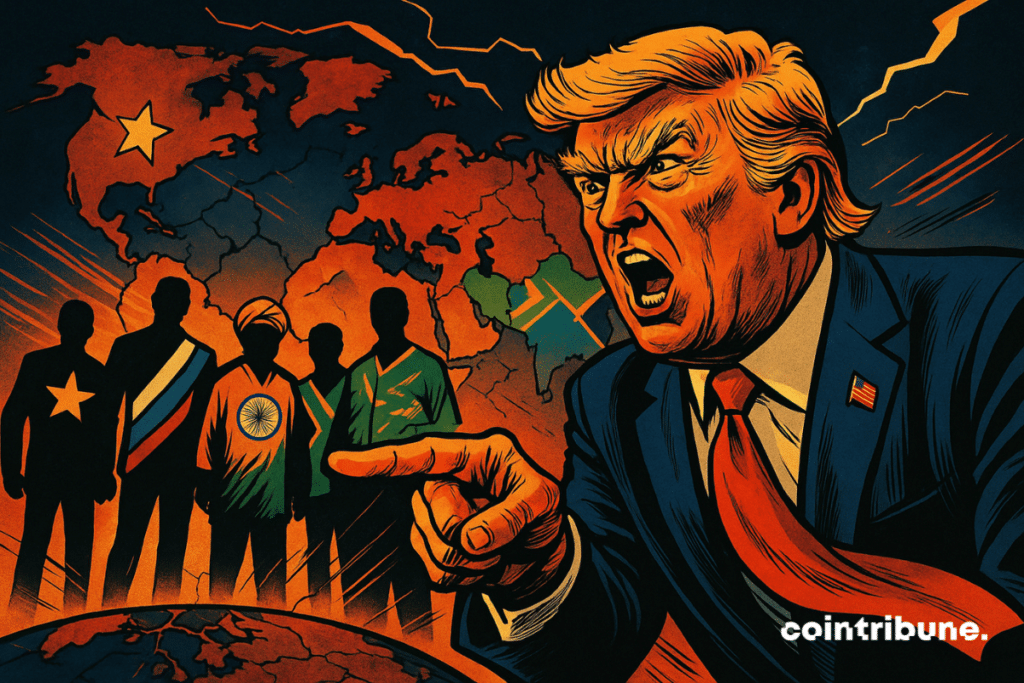Trump Reignites Monetary War With Bold BRICS Attack
As emerging powers strengthen their economic cooperation, Donald Trump heightens tensions by directly targeting the BRICS bloc. His tariff threats and offensive remarks aim at much more than just an alliance: it is the hegemony of the dollar, the future of multilateral policies, and ambitions around digital currencies that are at stake. This stance, both political and economic, could reshuffle the cards of international trade and impact the already fragile balance between the Western sphere and alternative strategies of emerging markets.

In Brief
- Donald Trump sharply criticized the BRICS alliance, which he sees as a direct threat to U.S. economic interests.
- He stated that if the group structured itself ‘in a meaningful way,’ it ‘would end very quickly,’ without naming the countries involved.
- Trump accuses the group, without providing proof, of seeking to harm the dollar and weaken its status as the global reserve currency.
- By rejecting any digital monetary evolution and threatening the BRICS, Trump fuels a climate of global monetary instability.
Tariffs, threats, and shock rhetoric : Trump’s response to the BRICS
During a public statement in Washington on July 18 a few days after the conclusion of the bloc’s summit in Brazil, Donald Trump intensified his campaign against the BRICS, an alliance of emerging powers he considers a strategic threat to American interests.
“When I heard about this BRICS group, six countries, roughly, I hit them very, very hard. And if they really form in a meaningful way, it will end very quickly”, he asserted, without explicitly naming the countries concerned.
The message is clear: any attempt to effectively structure the BRICS bloc would be immediately countered by the United States.
In this context, several measures have been announced or reaffirmed by the American president, signaling a unilateral hardening :
- Implementation of a 10 % tariff on imports from countries he deems aligned with the BRICS’ “anti-American policies” ;
- An explicit warning against any consolidation of the group : Trump believes the alliance would fail if it took a “meaningful” form ;
- Repeated accusations, without evidence, that the BRICS seek to “harm the United States and the dollar’s role as the world reserve currency” ;
- A resolutely sovereign discourse, faithful to his “America First” doctrine : “we can never let anyone play games with us”.
By targeting this group of countries, Trump sends a clear signal about the place he intends to allow alternative economic blocs : none. The BRICS, which position themselves as a forum for multilateral cooperation in a fragmented world, are here perceived as a direct threat to the United States’ global leadership, notably in trade and monetary terms.
Dollar, digital currency, and monetary fragmentation : what Trump really wants to prevent
Alongside his attacks on the BRICS, Donald Trump affirmed his determination to defend the supremacy of the dollar at all costs. “I am determined to preserve the dollar’s status as the world’s reserve currency”, he stressed, while promising to “never allow the creation of a central bank digital currency (CBDC) in the United States”.
By rejecting the path of the digital dollar, Trump is directly opposing a trend that many economies, including some BRICS members, are actively exploring.
The U.S. president’s statements come as the BRICS quietly advance a cross-border payment system called BRICS Pay, intended to facilitate transactions in local currencies.
Although the common currency project was abandoned by Brazil in February, establishing an alternative financial infrastructure to the dollar remains a strategic goal for the group. These initiatives are seen in Washington as attempts to escape the American financial orbit.
This monetary polarization could have long-term consequences: increased fragmentation of the global financial system, higher volatility in emerging markets, and a partial challenge to the universality of the dollar. For investors, this opposition between monetary blocs could foster a favorable environment for adopting cryptos as tools for circumvention or hedging. Clearly, Trump’s reaction, far from discouraging the BRICS, could well strengthen their will to build an alternative system… with or without the dollar.
Maximize your Cointribune experience with our "Read to Earn" program! For every article you read, earn points and access exclusive rewards. Sign up now and start earning benefits.
Diplômé de Sciences Po Toulouse et titulaire d'une certification consultant blockchain délivrée par Alyra, j'ai rejoint l'aventure Cointribune en 2019. Convaincu du potentiel de la blockchain pour transformer de nombreux secteurs de l'économie, j'ai pris l'engagement de sensibiliser et d'informer le grand public sur cet écosystème en constante évolution. Mon objectif est de permettre à chacun de mieux comprendre la blockchain et de saisir les opportunités qu'elle offre. Je m'efforce chaque jour de fournir une analyse objective de l'actualité, de décrypter les tendances du marché, de relayer les dernières innovations technologiques et de mettre en perspective les enjeux économiques et sociétaux de cette révolution en marche.
The views, thoughts, and opinions expressed in this article belong solely to the author, and should not be taken as investment advice. Do your own research before taking any investment decisions.